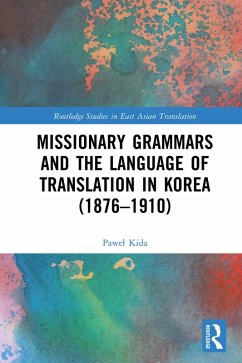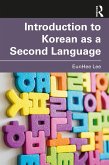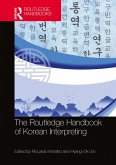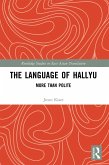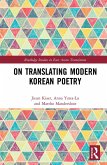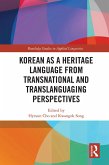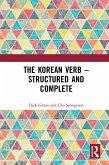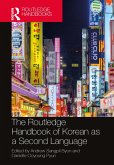Pawel Kida
Missionary Grammars and the Language of Translation in Korea (1876-1910) (eBook, PDF)
42,95 €
42,95 €
inkl. MwSt.
Sofort per Download lieferbar

21 °P sammeln
42,95 €
Als Download kaufen

42,95 €
inkl. MwSt.
Sofort per Download lieferbar

21 °P sammeln
Jetzt verschenken
Alle Infos zum eBook verschenken
42,95 €
inkl. MwSt.
Sofort per Download lieferbar
Alle Infos zum eBook verschenken

21 °P sammeln
Pawel Kida
Missionary Grammars and the Language of Translation in Korea (1876-1910) (eBook, PDF)
- Format: PDF
- Merkliste
- Auf die Merkliste
- Bewerten Bewerten
- Teilen
- Produkt teilen
- Produkterinnerung
- Produkterinnerung

Bitte loggen Sie sich zunächst in Ihr Kundenkonto ein oder registrieren Sie sich bei
bücher.de, um das eBook-Abo tolino select nutzen zu können.
Hier können Sie sich einloggen
Hier können Sie sich einloggen
Sie sind bereits eingeloggt. Klicken Sie auf 2. tolino select Abo, um fortzufahren.

Bitte loggen Sie sich zunächst in Ihr Kundenkonto ein oder registrieren Sie sich bei bücher.de, um das eBook-Abo tolino select nutzen zu können.
Missionary Grammars and the Language of Translation in Korea 1876-1910 embraces the Enlightenment period in Korea (1876-1910) after the opening of the so-called 'Hermit Nation' in describing the Korean language and missionary works.
- Geräte: PC
- mit Kopierschutz
- eBook Hilfe
Andere Kunden interessierten sich auch für
![Introduction to Korean as a Second Language (eBook, PDF) Introduction to Korean as a Second Language (eBook, PDF)]() Eunhee LeeIntroduction to Korean as a Second Language (eBook, PDF)40,95 €
Eunhee LeeIntroduction to Korean as a Second Language (eBook, PDF)40,95 €![The Routledge Handbook of Korean Interpreting (eBook, PDF) The Routledge Handbook of Korean Interpreting (eBook, PDF)]() The Routledge Handbook of Korean Interpreting (eBook, PDF)46,95 €
The Routledge Handbook of Korean Interpreting (eBook, PDF)46,95 €![The Language of Hallyu (eBook, PDF) The Language of Hallyu (eBook, PDF)]() Jieun KiaerThe Language of Hallyu (eBook, PDF)42,95 €
Jieun KiaerThe Language of Hallyu (eBook, PDF)42,95 €![On Translating Modern Korean Poetry (eBook, PDF) On Translating Modern Korean Poetry (eBook, PDF)]() Jieun KiaerOn Translating Modern Korean Poetry (eBook, PDF)42,95 €
Jieun KiaerOn Translating Modern Korean Poetry (eBook, PDF)42,95 €![Korean as a Heritage Language from Transnational and Translanguaging Perspectives (eBook, PDF) Korean as a Heritage Language from Transnational and Translanguaging Perspectives (eBook, PDF)]() Korean as a Heritage Language from Transnational and Translanguaging Perspectives (eBook, PDF)42,95 €
Korean as a Heritage Language from Transnational and Translanguaging Perspectives (eBook, PDF)42,95 €![The Korean Verb - Structured and Complete (eBook, PDF) The Korean Verb - Structured and Complete (eBook, PDF)]() Dick GruneThe Korean Verb - Structured and Complete (eBook, PDF)44,95 €
Dick GruneThe Korean Verb - Structured and Complete (eBook, PDF)44,95 €![The Routledge Handbook of Korean as a Second Language (eBook, PDF) The Routledge Handbook of Korean as a Second Language (eBook, PDF)]() The Routledge Handbook of Korean as a Second Language (eBook, PDF)46,95 €
The Routledge Handbook of Korean as a Second Language (eBook, PDF)46,95 €-
-
-
Missionary Grammars and the Language of Translation in Korea 1876-1910 embraces the Enlightenment period in Korea (1876-1910) after the opening of the so-called 'Hermit Nation' in describing the Korean language and missionary works.
Dieser Download kann aus rechtlichen Gründen nur mit Rechnungsadresse in A, B, BG, CY, CZ, D, DK, EW, E, FIN, F, GR, HR, H, IRL, I, LT, L, LR, M, NL, PL, P, R, S, SLO, SK ausgeliefert werden.
Produktdetails
- Produktdetails
- Verlag: Taylor & Francis eBooks
- Seitenzahl: 212
- Erscheinungstermin: 27. März 2024
- Englisch
- ISBN-13: 9781003858430
- Artikelnr.: 69942779
- Verlag: Taylor & Francis eBooks
- Seitenzahl: 212
- Erscheinungstermin: 27. März 2024
- Englisch
- ISBN-13: 9781003858430
- Artikelnr.: 69942779
- Herstellerkennzeichnung Die Herstellerinformationen sind derzeit nicht verfügbar.
Pawel Kida, PhD, Chief of Korean Language Department, Faculty of Ethnolinguistics, Adam Mickiewicz University Poznan, Poland.
List of Figures
List of Tables
Acknowledgments
Preface
Preliminaries
Abbreviations
1. METAGRAMMATICAL THOUGHT
1.1. Foreign evaluation of former Korean grammar
1.2. Korean evaluation of former Korean grammar
1.3. Missionary Grammars
2. AUTHORS AND GRAMMARS' CONTENT
2.1. John Ross (1842-1915)
2.2. Felix-Clair Ridel (1830-1884)
2.3. James Scott (1850-1920)
2.4. Camille Imbault-Huart (1857-1897)
2.5. Horace Grant Underwood (1859-1916)
2.6. James Scrath Gale (1863-1937)
2.7. Annie Laurie Baird (1864-1916)
3. MORPHOSYNTACTIC MODEL
3.1. Partes Orationis
3.1.1. Noun
3.1.1.1. Case
3.1.1.2. Gender
3.1.1.3. Number
3.1.2. Pronoun
3.1.2.1. Personal
3.1.2.2. Demonstrative
3.1.2.3. Reflexive
3.1.2.4. Interrogative
3.1.2.5. Indefinite
3.1.2.6. Possessive
3.1.2.7. Relative
3.1.2.8. Distributive
3.1.3. Numeral
3.1.3.1. Cardinal
3.1.3.2. Ordinal
3.1.3.3. Fractional
3.1.3.4. Multiplicative
3.1.3.5. Classifiers
3.1.4. Verb
3.1.4.1. Voice
3.1.4.2. Mood
3.1.4.3. Tense
3.1.4.4. Conjugation
3.1.4.5. Basal Conjugation
3.1.4.6. Participle
3.1.4.7. Auxiliary Verb
3.1.4.8. Verbal noun
3.1.4.9. Gerundive/Supine
3.1.5. Adjective
3.1.5.1. Comparative degree
3.1.5.2. Superlative degree
3.1.6. Adverb
3.1.7. Postposition
3.1.8. Conjunction
3.1.9. Interjection
3.2. Sententiae Structura
3.2.1. Negation
3.2.2. Passive
3.2.3. Causative
3.2.4. Honorifics
3.2.5. Indirect Speech
Conclusions
Bibliography
Grammatical Units and Korean Words
Index
List of Tables
Acknowledgments
Preface
Preliminaries
Abbreviations
1. METAGRAMMATICAL THOUGHT
1.1. Foreign evaluation of former Korean grammar
1.2. Korean evaluation of former Korean grammar
1.3. Missionary Grammars
2. AUTHORS AND GRAMMARS' CONTENT
2.1. John Ross (1842-1915)
2.2. Felix-Clair Ridel (1830-1884)
2.3. James Scott (1850-1920)
2.4. Camille Imbault-Huart (1857-1897)
2.5. Horace Grant Underwood (1859-1916)
2.6. James Scrath Gale (1863-1937)
2.7. Annie Laurie Baird (1864-1916)
3. MORPHOSYNTACTIC MODEL
3.1. Partes Orationis
3.1.1. Noun
3.1.1.1. Case
3.1.1.2. Gender
3.1.1.3. Number
3.1.2. Pronoun
3.1.2.1. Personal
3.1.2.2. Demonstrative
3.1.2.3. Reflexive
3.1.2.4. Interrogative
3.1.2.5. Indefinite
3.1.2.6. Possessive
3.1.2.7. Relative
3.1.2.8. Distributive
3.1.3. Numeral
3.1.3.1. Cardinal
3.1.3.2. Ordinal
3.1.3.3. Fractional
3.1.3.4. Multiplicative
3.1.3.5. Classifiers
3.1.4. Verb
3.1.4.1. Voice
3.1.4.2. Mood
3.1.4.3. Tense
3.1.4.4. Conjugation
3.1.4.5. Basal Conjugation
3.1.4.6. Participle
3.1.4.7. Auxiliary Verb
3.1.4.8. Verbal noun
3.1.4.9. Gerundive/Supine
3.1.5. Adjective
3.1.5.1. Comparative degree
3.1.5.2. Superlative degree
3.1.6. Adverb
3.1.7. Postposition
3.1.8. Conjunction
3.1.9. Interjection
3.2. Sententiae Structura
3.2.1. Negation
3.2.2. Passive
3.2.3. Causative
3.2.4. Honorifics
3.2.5. Indirect Speech
Conclusions
Bibliography
Grammatical Units and Korean Words
Index
List of Figures
List of Tables
Acknowledgments
Preface
Preliminaries
Abbreviations
1. METAGRAMMATICAL THOUGHT
1.1. Foreign evaluation of former Korean grammar
1.2. Korean evaluation of former Korean grammar
1.3. Missionary Grammars
2. AUTHORS AND GRAMMARS' CONTENT
2.1. John Ross (1842-1915)
2.2. Felix-Clair Ridel (1830-1884)
2.3. James Scott (1850-1920)
2.4. Camille Imbault-Huart (1857-1897)
2.5. Horace Grant Underwood (1859-1916)
2.6. James Scrath Gale (1863-1937)
2.7. Annie Laurie Baird (1864-1916)
3. MORPHOSYNTACTIC MODEL
3.1. Partes Orationis
3.1.1. Noun
3.1.1.1. Case
3.1.1.2. Gender
3.1.1.3. Number
3.1.2. Pronoun
3.1.2.1. Personal
3.1.2.2. Demonstrative
3.1.2.3. Reflexive
3.1.2.4. Interrogative
3.1.2.5. Indefinite
3.1.2.6. Possessive
3.1.2.7. Relative
3.1.2.8. Distributive
3.1.3. Numeral
3.1.3.1. Cardinal
3.1.3.2. Ordinal
3.1.3.3. Fractional
3.1.3.4. Multiplicative
3.1.3.5. Classifiers
3.1.4. Verb
3.1.4.1. Voice
3.1.4.2. Mood
3.1.4.3. Tense
3.1.4.4. Conjugation
3.1.4.5. Basal Conjugation
3.1.4.6. Participle
3.1.4.7. Auxiliary Verb
3.1.4.8. Verbal noun
3.1.4.9. Gerundive/Supine
3.1.5. Adjective
3.1.5.1. Comparative degree
3.1.5.2. Superlative degree
3.1.6. Adverb
3.1.7. Postposition
3.1.8. Conjunction
3.1.9. Interjection
3.2. Sententiae Structura
3.2.1. Negation
3.2.2. Passive
3.2.3. Causative
3.2.4. Honorifics
3.2.5. Indirect Speech
Conclusions
Bibliography
Grammatical Units and Korean Words
Index
List of Tables
Acknowledgments
Preface
Preliminaries
Abbreviations
1. METAGRAMMATICAL THOUGHT
1.1. Foreign evaluation of former Korean grammar
1.2. Korean evaluation of former Korean grammar
1.3. Missionary Grammars
2. AUTHORS AND GRAMMARS' CONTENT
2.1. John Ross (1842-1915)
2.2. Felix-Clair Ridel (1830-1884)
2.3. James Scott (1850-1920)
2.4. Camille Imbault-Huart (1857-1897)
2.5. Horace Grant Underwood (1859-1916)
2.6. James Scrath Gale (1863-1937)
2.7. Annie Laurie Baird (1864-1916)
3. MORPHOSYNTACTIC MODEL
3.1. Partes Orationis
3.1.1. Noun
3.1.1.1. Case
3.1.1.2. Gender
3.1.1.3. Number
3.1.2. Pronoun
3.1.2.1. Personal
3.1.2.2. Demonstrative
3.1.2.3. Reflexive
3.1.2.4. Interrogative
3.1.2.5. Indefinite
3.1.2.6. Possessive
3.1.2.7. Relative
3.1.2.8. Distributive
3.1.3. Numeral
3.1.3.1. Cardinal
3.1.3.2. Ordinal
3.1.3.3. Fractional
3.1.3.4. Multiplicative
3.1.3.5. Classifiers
3.1.4. Verb
3.1.4.1. Voice
3.1.4.2. Mood
3.1.4.3. Tense
3.1.4.4. Conjugation
3.1.4.5. Basal Conjugation
3.1.4.6. Participle
3.1.4.7. Auxiliary Verb
3.1.4.8. Verbal noun
3.1.4.9. Gerundive/Supine
3.1.5. Adjective
3.1.5.1. Comparative degree
3.1.5.2. Superlative degree
3.1.6. Adverb
3.1.7. Postposition
3.1.8. Conjunction
3.1.9. Interjection
3.2. Sententiae Structura
3.2.1. Negation
3.2.2. Passive
3.2.3. Causative
3.2.4. Honorifics
3.2.5. Indirect Speech
Conclusions
Bibliography
Grammatical Units and Korean Words
Index
